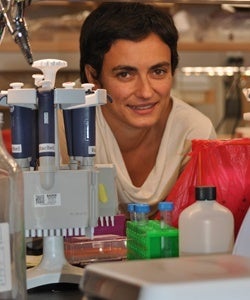Related Topics
Bird flu research needs broader discussion
HSPH infectious disease expert Marc Lipsitch is concerned that the public has shown little interest in the debate over the potential risks and benefits of conducting bird flu research. There needs to be a much broader conversation that…
Funding, political support critical for polio eradication
The 24-year international campaign to eradicate polio is “within striking distance of its goal,” but could become undone if obstacles to vaccination stall further progress, Jay A. Winsten, associate dean for health communication and Frank Stanton director for…
New drugs, strategies needed to combat drug-resistant tuberculosis
Medical researchers from around the globe met June 28, 2012 at the Broad Institute of Harvard and MIT to discuss ways to combat the emergence of a form of drug-resistant tuberculosis. During a panel discussion at the day-long…
Restrict future research on bird flu virus, HSPH experts recommend
Marc Lipsitch, professor of epidemiology and director of the Center for Communicable Disease Dynamics at Harvard School of Public Health, and former HSPH dean [[Barry Bloom]], Harvard University Distinguished Service Professor and Joan L. and Julius H. Jacobson…
Study digs into secrets of keeping HIV in check
Certain HIV-infected patients — about one in every 200 to 300 — are able to resist the AIDS virus for years. It appears these people have immune system cells that are better able to detect and kill HIV-infected…
Chagas disease dubbed “The new AIDS of the Americas”
Chagas disease, a potentially deadly ailment that afflicts an estimated 8 to 11 million people worldwide, has been dubbed “the new AIDS of the Americas” in an editorial in the journal PLoS Neglected Tropical Diseases. According to a…
Off the cuff: Mosquitoes, sex, & malaria
[ Spring/Summer 2012 ] Q: You study how genes affect mosquito fertility and mating, a potentially groundbreaking way to prevent malaria transmission. In perfecting this approach, you work with Anopheles gambiae, the chief vector of malaria—but also one of the most…

Burma: A central battleground for malaria control
Despite progress in the global fight against malaria over the past decade, the emergence in Southeast Asia of malaria parasites resistant to artemisinin — the standard drug used to treat the disease — raises serious new challenges. While…
The promise of big data
[ Spring/Summer 2012 ] Petabytes of raw information could provide clues for everything from preventing TB to shrinking health care costs—if we can figure out how to use them. Harvard School of Public Health microbiologist Sarah Fortune went…

William Foege awarded Presidential Medal of Freedom
May 10, 2012 Former CDC Director and Global Health Champion Helped Eradicate Smallpox Harvard School of Public Health (HSPH) alumnus William Foege, MPH ’65, legendary for his work in the late 1970s to eradicate smallpox, has been named…
